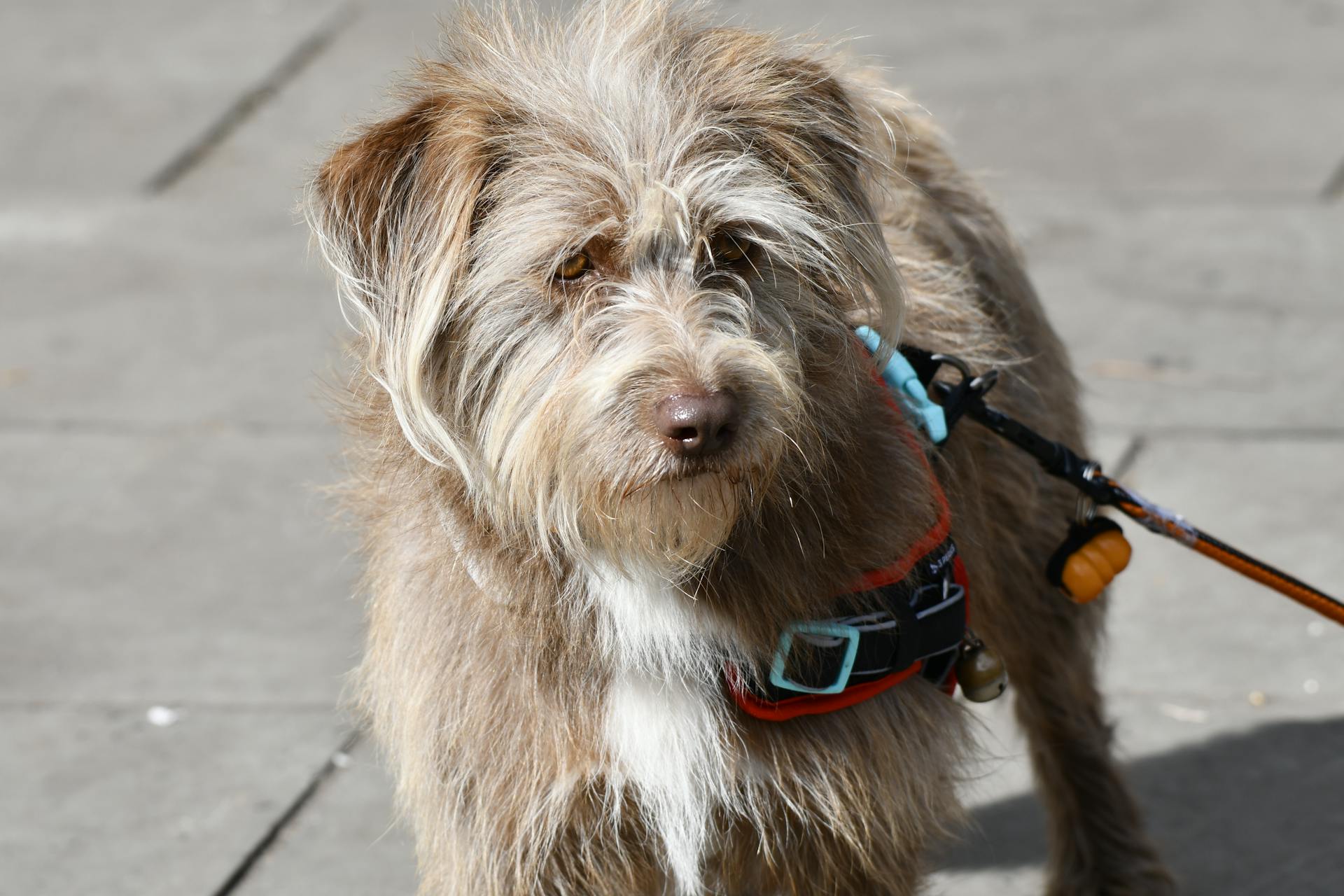
Dutch Shepherds are generally a healthy breed, but like all breeds, they can be prone to certain health issues. Hip dysplasia is a common problem in Dutch Shepherds, with some studies showing that up to 25% of the breed may be affected.
Dutch Shepherds are also at risk for eye problems, with cataracts and progressive retinal atrophy being two of the most common issues. In fact, a study found that over 10% of Dutch Shepherds developed cataracts by the age of 10.
Gastric dilatation-volvulus (GDV), also known as bloat, is another health concern for Dutch Shepherds. This condition occurs when the stomach fills with gas and twists, cutting off blood flow and potentially leading to death if not treated promptly.
Dutch Shepherds are also prone to allergies and skin issues, with some owners reporting problems with itching, scratching, and skin infections.
You might enjoy: Dog Health Issues by Breed
Health Problems
Dutch Shepherds are generally a healthy breed, but like all breeds, they can be prone to certain health issues. They have an average lifespan of 11 to 14 years.
One of the health issues Dutch Shepherds can be prone to is hip dysplasia. This is a condition where the hip joint doesn't form properly, leading to arthritis and mobility problems.
Goniodysplasia is another condition that can affect Dutch Shepherds, particularly those with wire-haired coats. This condition affects the flow of eye fluids, which can lead to blindness if left untreated.
Inflammatory myopathy is a progressive disease that can affect the muscles of a Dutch Shepherd. This condition involves the rapid degeneration of muscles, which can lead to muscle weakness and wasting.
There are some health tests that can be done to check for these conditions, including ophthalmological evaluation and hip evaluation. These tests can help identify any potential health issues early on, so you can take steps to prevent or manage them.
Explore further: Can German Shepherds Tolerate Cold Weather
Nutrition and Feeding
Your Dutch Shepherd's diet is crucial for maintaining their overall health. A high-quality protein source like chicken, beef, or fish should be the main focus of their meals.
Adult Dutch Shepherds thrive on a twice-daily feeding schedule, which helps regulate digestion and prevents issues like bloat. Consistency is key, so aim for a morning and evening feeding routine.
To determine the right amount of food for your Dutch Shepherd, consider their weight and activity level. Your veterinarian can provide a personalized recommendation based on your dog's unique needs.
Dutch Shepherds require nutrient-rich formulas that cater to their life stage. Puppies need puppy food before transitioning to an adult formula, while adult dogs benefit from a balanced formula approved by the Association of American Feed Control Officials (AAFCO).
A good rule of thumb is to feed your Dutch Shepherd 2-3 cups of high-quality dry dog food per day. However, this amount can vary depending on their activity level, age, and size.
Some supplements can be beneficial for Dutch Shepherds, especially those with active lifestyles. Omega-3 fatty acids, probiotics, multivitamins, and joint supplements are all worth considering, but consult with your vet before adding any new supplements to their diet.
Here's a quick rundown of some essential supplements for Dutch Shepherds:
- Omega-3 fatty acids (fish oil)
- Probiotics
- Multivitamins (based on life stage)
- Joint supplements
Grooming and Care
Dutch Shepherds need regular brushing to remove dead hair and keep their coat clean and free of mats, especially during seasonal shedding periods.
Daily brushing is a must during these times. Their wire-haired coat requires a bit more work, but it's still manageable with proper care.
Their nails should be trimmed regularly, and you'll know it's time when you can hear them clicking on the floor. If you're unsure, don't hesitate to ask a professional groomer for help.
Ears should be checked regularly to prevent wax and debris buildup, which can lead to infections. Cleaning your dog's teeth is also crucial, but be sure to use dog toothpaste that doesn't contain Xylitol.
Bathing should be done as needed, and it's a good opportunity to check for cuts or scrapes on their bodies. Dutch Shepherds generally don't require special skin care, but consult your veterinarian if you notice any concerning changes in their skin.
Weekly brushing is recommended to reduce shedding and keep their coat healthy. They don't need professional grooming unless you're struggling with grooming at home.
A unique perspective: German Shorthaired Pointer Skin Problems
Health Conditions
Dutch Shepherds are generally a healthy breed, but like all breeds, they can be prone to certain health issues. Hip dysplasia is a common condition that can be painful for your dog if not treated early.
Hip dysplasia occurs when the hip joints don't form properly, causing discomfort and arthritis. Signs of hip dysplasia include decreased activity, difficulty walking, and lameness in one or both hind legs.
To manage hip dysplasia, your vet may recommend a weight-loss or exercise program, physical therapy, joint supplements, or medications. In severe cases, surgery may be necessary to correct joint movement.
Here are some common signs of hip dysplasia:
- Decreased activity or movement
- Difficulty walking, running, or jumping
- Lameness in one or both hind legs
- Limping or stiffness
- Awkward movement or gait
Goniodysplasia is another condition that can affect Dutch Shepherds, particularly wire-haired ones. It's a condition where eye fluids don't flow properly, which can lead to blindness if left untreated.
Common Symptoms
Dutch Shepherds can be prone to various health issues, but recognizing the common symptoms can help you catch problems early.
Frequent urination, blood in the urine, and straining to urinate are common symptoms of urinary tract inflammation in Dutch Shepherds.
Hip dysplasia is a common skeletal condition that occurs when the hip joints don't form properly, causing pain and discomfort. Decreased activity or movement, difficulty walking, running, or jumping, and lameness in one or both hind legs are all signs of hip dysplasia.
Other symptoms of hip dysplasia include limping or stiffness, awkward movement or gait, and weight loss due to pain.
Elbow dysplasia, another orthopedic condition, can cause similar symptoms, including discomfort and pain in the elbow joint.
Dogs with hyperuricosuria, a condition caused by a genetic mutation, may also experience loss of appetite, lethargy, weakness, vomiting, and pain due to urinary stones.
A table to summarize the common symptoms:
Early detection and treatment are crucial to managing these health issues and improving your Dutch Shepherd's quality of life.
Gastric Dilatation-Volvulus (Bloat)
Dutch Shepherds are prone to gastric dilatation-volvulus, a life-threatening form of bloat.
This condition occurs when the stomach fills with gas and twists, cutting off blood to vital organs. If your dog shows signs of GDV or bloat, immediate veterinary attention is needed.
Feeding your dog multiple small meals a day instead of one large meal can help prevent bloat.
Avoiding vigorous exercise after eating is also crucial in preventing bloat.
Using slow-feeding bowls can help reduce the risk of bloat.
A preventative gastropexy procedure can also be done to prevent the stomach from twisting. This procedure is often done at the same time as a spay or neuter surgery.
Explore further: How to Prevent Twisted Stomach in Dogs
Size and Breed
The Dutch Shepherd is a medium-sized breed, typically weighing between 35-50 pounds and standing between 19-23 inches tall at the shoulder.
Their medium size can contribute to certain health issues, such as hip dysplasia, which is a common problem in larger breeds.
Dutch Shepherds come in two main sizes: the miniature Dutch Shepherd and the standard Dutch Shepherd, both of which are prone to similar health issues.
Their compact size can also make them more susceptible to eye problems, such as cataracts and progressive retinal atrophy.
Dog Breed Size
Dutch Shepherds, on average, stand about 21-24.5 inches at the shoulder.
Male Dutch Shepherds can grow up to 75 pounds, but most weigh in the 50-70 pound range.
Males are slightly larger and wider than females, and the difference is easily noticeable.
Females are on the lower end of the weight range, but some are even smaller at around 45 pounds.
Dog Breed
Dutch Shepherds are a high-energy breed that thrives on physical activity. They need multiple walks and playtime sessions every day to keep them happy and healthy.
Their herding backgrounds give them plenty of energy to burn, making them great companions for active families. They excel in dog sports like agility events, nose work competitions, and protection sports.
Dutchies love to explore and enjoy the outdoors, so taking them on long hikes and excursions is a great way to give them exercise and mental stimulation.
Testing and Diagnosis
Genetic testing is a crucial step in determining the health of your Dutch Shepherd. Genetic testing of the SLC2A9 gene will reliably determine whether a dog is a genetic Carrier of hyperuricosuria.
Hyperuricosuria is inherited in an Autosomal Recessive manner in dogs, meaning they must receive two copies of the mutated gene to develop the disease. Carrier dogs do not have features of the disease but when bred with another carrier, there's a risk of having affected pups.
Each pup born to this pairing has a 25% chance of inheriting the disease and a 50% chance of inheriting one copy and being a carrier of the SLC2A9 gene mutation. Reliable genetic testing is important for determining breeding practices.
Genetic testing should be performed before breeding to eliminate the mutation from breeding lines and avoid producing affected pups. Breeding of known carriers to each other is not recommended to prevent this.
A normal result does not exclude a different mutation in this gene or any other gene that may result in a similar genetic disease or trait.
Frequently Asked Questions
What is the life expectancy of a Dutch Shepherd?
Dutch Shepherds typically live between 11 to 14 years with proper care. Consult a veterinarian or breeder to determine the best diet for your dog's longevity.
Featured Images: pexels.com


